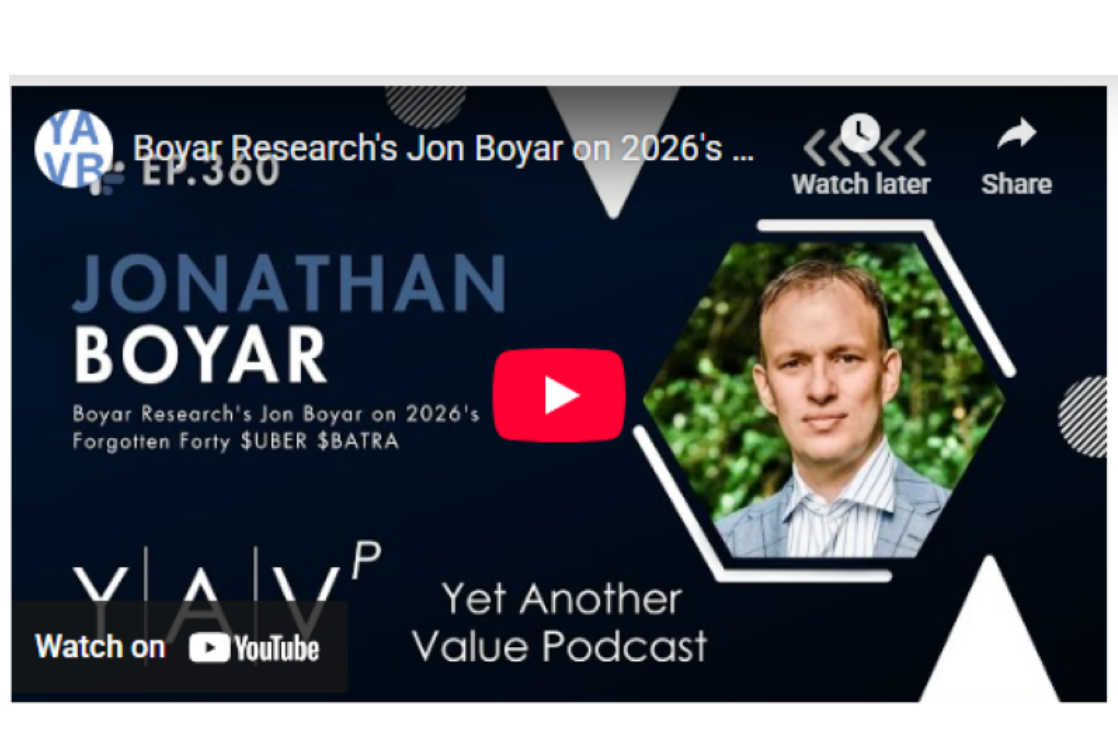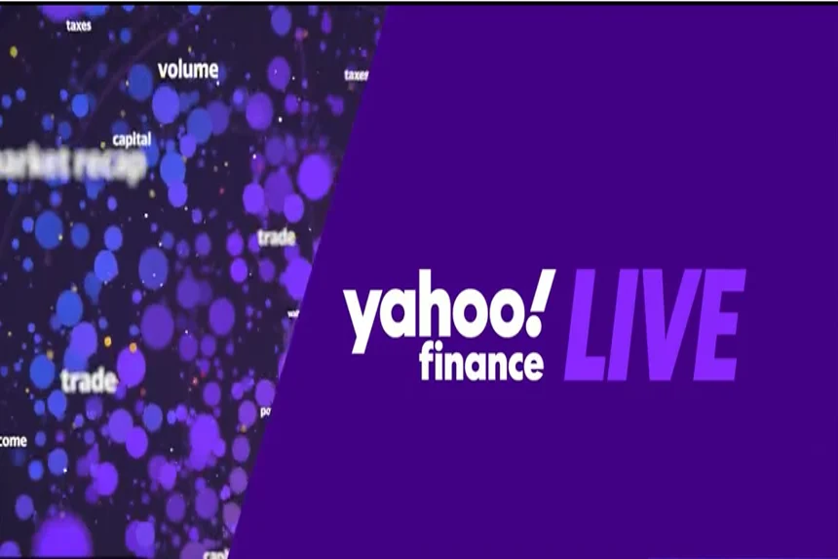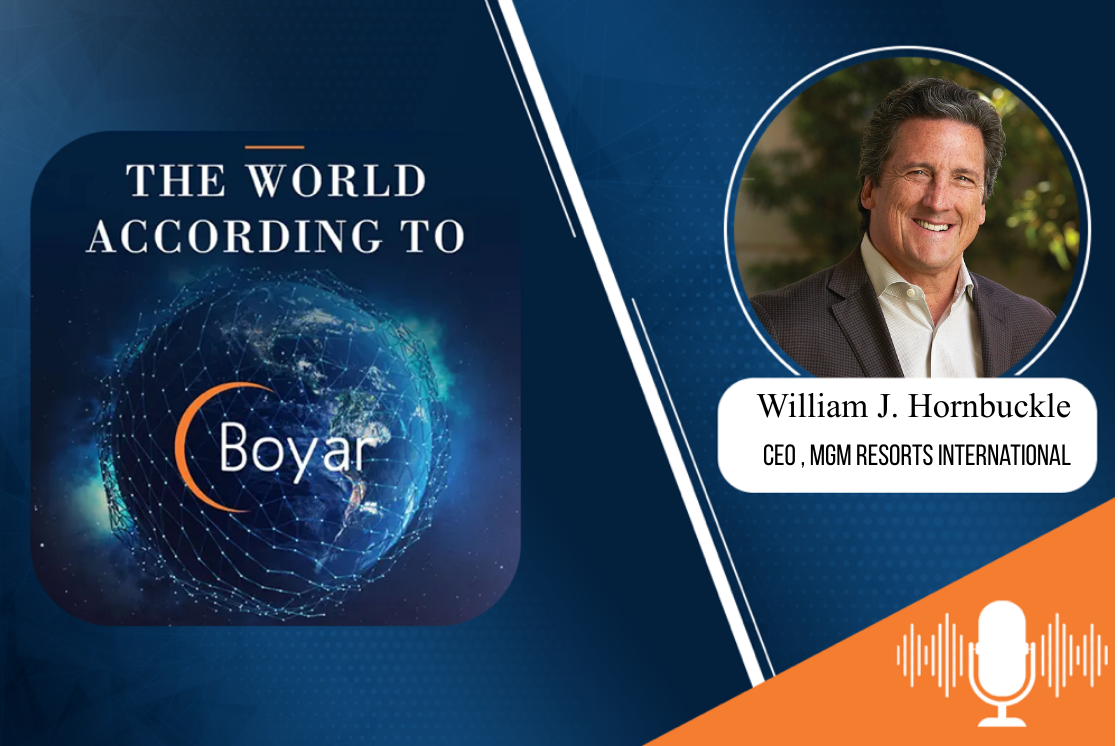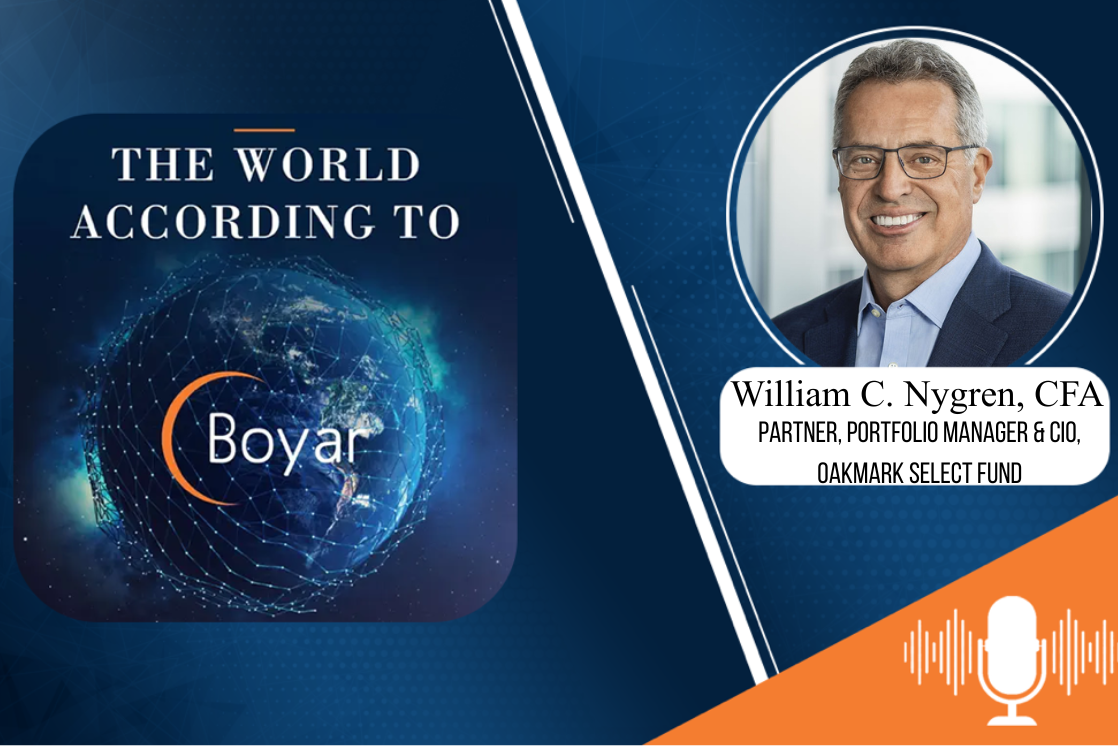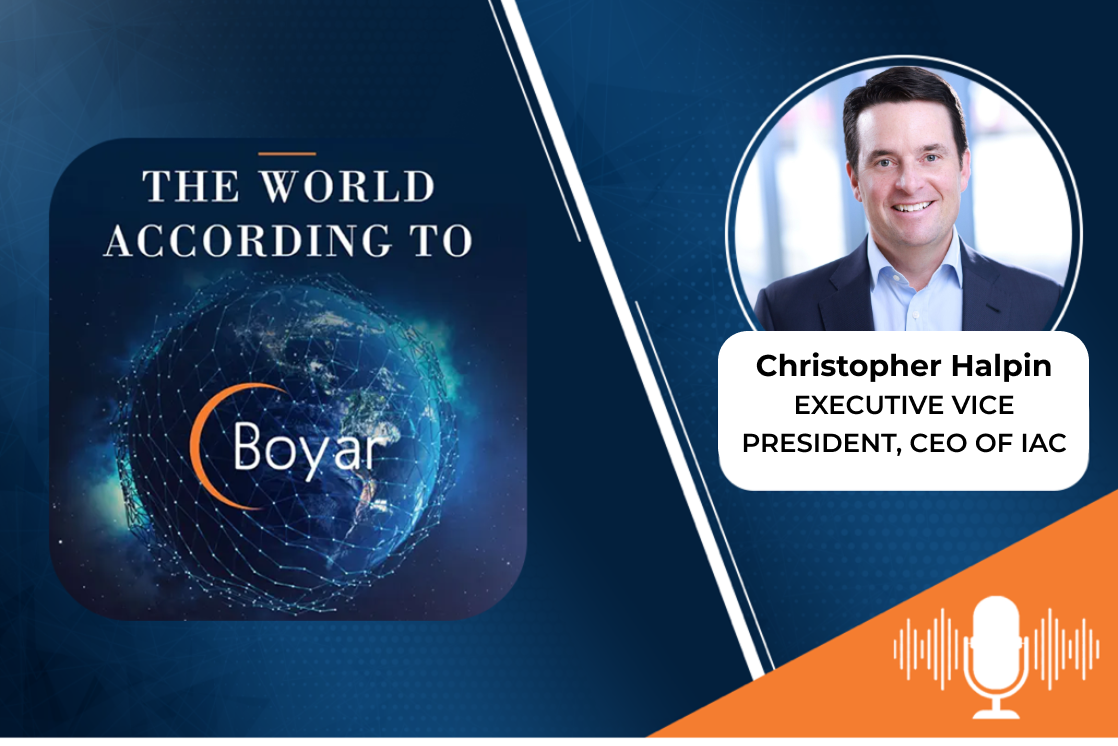The Wall Street Journal’s Spencer Jakab on the real winners of GameStop mania, Robinhood’s role in encouraging stock speculation and more...
James Hagedorn, Scotts Miracle-Gro Chief Executive Officer and Chairman of the Board, on the tremendous opportunity in the cannabis space, potentially spinning off the fast-growing Hawthorne division and more... - Value Investing Podcast
Caleb Silver, Journalist & Editor in Chief of Investopedia, on how Investopedia is helping individual investors and how to get your website on the first page of Google. - Value Investing Podcast
Michael Santoli, Senior Markets commentator at CNBC on how he has used his experience covering 9/11 and has applied that to Covid-19. He also discusses the importance of Twitter in journalism. - Value Investing Podcast
The Interview Discusses:
- His fascinating new book, The Revolution That Wasn’t: GameStop, Reddit, and the Fleecing of Small Investors.
- Robinhood’s unique business model and whether Robinhood has “democratized” finance as it claims.
- How Robinhood came very close to the brink of insolvency.
- The role of “influencers” like Chamath Palihapitiya, Elon Musk, and David Portnoy in driving the speculative excess of 2021.
- His surprising take on Keith Gill, aka “Roaring Kitty.”
About Spencer Jakab:
Spencer Jakab is an award-winning financial journalist and a former top-rated stock analyst at Credit Suisse. He edits the Wall Street Journal’s “Heard on the Street” column and previously wrote the daily investing column “Ahead of the Tape.” Prior to joining the Journal he wrote for the “Lex” and “On Wall Street” columns at Britain’s Financial Times.
Click Below to Read the Interview Transcript
Transcript of the Interview With Spencer Jakab:
[00:00:00] [music]
Jonathan Boyar: Welcome to The World According to Boyar, where we bring top investors, best-selling authors, and business leaders to show you the smartest ways to uncover value in the stock market. I am your host, Jonathan Boyar.
Today’s very special guest, Spencer Jakab, is a well-known name to readers of The Wall Street Journal, as he is editor of the Heard on the Street column. Prior to that, he worked at Financial Times. He was formerly an equity research analyst at Credit Suisse. He’s just released a fascinating new book called The Revolution That Wasn’t: GameStop, Reddit, and the Fleecing of Small Investors.
Spencer, welcome to the show.
Spencer Jakab: Hey, thanks for having me.
Jonathan: No, thanks. I really enjoy your column, and I enjoyed the book. You have a really interesting career. You took an interesting route. You’re now editor of the Heard on the Street column, but you started your career on Wall Street as an equity research analyst. What made you make the switch?
Spencer: I fell into that by accident, to be honest. I didn’t know anybody, growing up, who worked on Wall Street at all, or in journalism, for that matter. My parents immigrated here in the ’20s. Everyone who they knew and who we knew were in the same boat. They’ve obviously wanted me to go to college and do something, earn a bit of money and be able to support myself, but Wall Street was just totally terra incognita, and even among my friends in college.
Then, I got an application by accident to a program at Columbia University that’s a quasi-professional program. Literally, I got it by accident. My undergraduate adviser, she was giving me recommendations for PhD programs in History and stuff like that, and she said, “No. I did that program, and maybe you should consider it. Maybe it’ll give you options and you can still be an academic, if that’s what you want.”
Literally, the first or second day, I met a kid who had been an investment banker, who is four years older than me, and we’re still friends, who had [00:02:00] been in that program. I’d heard the word investment banker. I think maybe I’d just read or that was the year that Liar’s Poker came out. I didn’t really understand what it was, and I asked him to explain it to me. It sounded fun. He hated it, but it sounded fun to me. I said, “Well, how do I get a job like that if I want?” He said, “Take all the finance courses.” We’re at Columbia University, and we could take all the classes that we wanted at Columbia Business School.
I took all the finance coursework that I was allowed to take, and I found it really interesting. I looked for jobs. My parents were immigrants from Eastern Europe. The Iron Curtain was falling, and things were being privatized. I wrote letters to investment banks and financial firms in New York, and did not really answer me or send me a polite decline.
Then, I got on. I don’t know if you remember there used to be these things called courier flights, where you could fly to places really cheaply. I had very little money, but I just got on a courier flight wearing my suit. I went to Helsinki, and then to Budapest, Hungary. I contacted people during a week there and said, “Hey, I’m in town. I’m bilingual. I know about finance. Would you like to hire me?” They all wanted to hire me, and so I just picked the one I liked best.
I spent almost a decade as, first, a country analyst, and then I became head of equity research actually for the entire region, from Russia to South Africa, eventually. I was good at being an equity analyst, and a team move, I guess 24 people at the peak, in those countries. I traveled all over. It was very interesting.
Then, I just got tired of it because I found the subject matter interesting, but I was just managing people and meeting clients all the time. I decided what I’d really like to do is just to talk to people about it and write about it. I’d become friendly that a kid, same background as me, except he’d become a journalist. We were very friendly. We still are friends. He said, “Listen, you can just get a job. You know things, you know useful things, if you want to be a financial journalist.” I literally I just applied [00:04:00] and met someone and got lucky and got my start. It was 19 years ago.
Jonathan: Let’s talk about your fascinating new book, The Revolution That Wasn’t: GameStop, Reddit, and the Fleecing of Small Investors. The title was certainly provocative, to say the least. Can you briefly tell us what the book is about?
Spencer: Sure. The book is not just about this, but it’s the event that inspired it, was GameStop mania, which took place in late January to early February 2021, when the shares of a struggling video game retailer in the US became the most traded security in the world for a few days, and became the center of a political and social firestorm.
Even before that happened, when I saw what was about to happen– I have three boys. One of my sons alerted me to what was going on because a friend of his was involved, and my son is on WallStreetBets on Reddit, which is the social network that was really at the center of inspiring this “revolution”. It took me 10 minutes to know that it was a crazy thing that we had not ever seen before that I had to write about. It only became, let’s say within the next three or four days, even more compelling and something to write about. Here was a story that touched retail investors, because you had this whole new group of investors who could never have been in the market. First of all, they’re young and typically not interested in the market. Second, they had so little money usually, that they would have chewed up their accounts, brokers wouldn’t have bothered with them a generation earlier. They couldn’t really have done what they were doing, and it also was a generation that had a very dim view of Wall Street, which plays into the story.
They took their little brokerage accounts, and they organize on social media, and they weaponize them into an attempted corner, and a very effective short squeeze to punish certain hedge funds that were short stocks like GameStop, but also AMC, BlackBerry, Nokia, Bed Bath & Beyond, the other meme stocks. [00:06:00] They blew multibillion-dollar holes in these hedge funds. This is something, as you know, being in the investment world, you can’t do. You can’t sneak up on somebody and get together in a smoke-filled room and say, “I’m going to buy just below the reporting limit, and you buy just below the reporting limit, and five of us are going to get together, and then we’re going to pounce on this guy who sold the stock short and force it through the roof.” The SEC would be paying you a visit very soon.
What about doing it out in the open? What about discussing it for several weeks on a message board that these guys just don’t happen to take very seriously or to read? I happen to know that some of the people who are victims did see their names. They did see what was being discussed, and they just didn’t take it seriously. It cost them billions of dollars because they didn’t take it seriously. That, in and of itself, was a crazy story. It’s the kind of thing that happened before there was an SEC, back in the days of Vanderbilt, and Jesse Livermore, and what have you, these crazy manipulations, stock watering, and corners and stuff that used to happen.
Then it became more incredible, because then Robinhood, which was the main broker for most of these people, was overwhelmed by the orders and had to stop purchases. A million conspiracy theories were spawned, and then Washington got involved. It became this populist uprising. Remember, this was just weeks after the Capitol riots, but it was something that left and right agreed on and completely misunderstood, or purposely misunderstood. The great crime that happened was that these young people, they’re mainly young people, were not able to keep on buying the meme stocks and pushing them to the roof and keep punishing the hedge funds, and it seemed very conveniently timed.
Now, there are a lot of things that Wall Street gets away with. It’s kind of heads, we win, tails, you lose. This didn’t happen to be one of them, but it seemed very convenient. It turned into congressional hearings, it turned into ongoing conspiracy theories. It’s like a real gift for a writer. I went all out to make sure that this could come out on the anniversary of the events. [00:08:00] Every night, every weekend, every vacation went to researching, and interviewing people and writing this book, so that it could get out at that date, but I never imagined, when I began, that it still would be a thing. That basically there would be groups of people who try to make the same thing happen and make lightning strike the second, third, fourth, fifth, sixth time, and that’s what’s happened. It’s still very much a story.
By the way, I’m reviled. If you look at Amazon reviews for my book, you’ll see kind of normal reviews and you’ll see one star, “This guy is a shill and whatever,” from people who didn’t read the book, because there’s this sense that there’s a conspiracy against them. Anybody who contradicts their version of events is a shill, and is in the pocket of hedge funds.
Every time I have to pay for kids’ braces or something, I wish that I was in the pocket of hedge funds because they probably pay a lot better than the Wall Street Journal, but I’m not. I can’t do that. I don’t even own stocks. Yes, it was a fascinating, crazy story with a lot of moving parts. I explained how it happened, which is a lot of things have to line up for this to happen the way it did.
Jonathan: Absolutely. You said you obviously did a ton of research and interviewed people. One of the ones that I know you interviewed was Jordan Belfort, The Wolf of Wall Street, and most people know about him, I guess, because of the movie, but there’s a lot more to it. What was that like?
Spencer: It was pretty cool. He was a little skeptical. He has minions of PR people. I think I dealt with three before I got to him, but they were skeptical and like, “Oh, you’re not going to ask him about that bit of unpleasantness that landed him in prison?” I said, “No, I think that he’s a person who understands consumer psychology.” He made some very astute comments. I’ll just tell you two of the things that he said. The book is definitely not a– He’s not a major player in the book, but I think his commentary is worthwhile because he understands better than most people, how the seamy underside of the market works, and how people think, and he said this [00:10:00] was a pump without the dump. The other thing that Jordan Belfort said is that, I knew this, but I think he just said it so well, was that you have to understand that Wall Street doesn’t care if it’s going up or down, bull market, bear market. What it cares about is activity, cares about turnover. When there’s no turnover, that’s when Wall Street is not happy.
That’s so true, and especially this latest conduit for retail investors for the stock market, where you charge zero commission, but then you get paid for selling trades to market makers. Your business model, you’re not selling them services, you’re not selling them, you’re not opening an IRA for them, you’re not doing all kinds of cash services and giving them a home mortgage and stuff like that like Schwab might. They have a median of $241 in their account, and you need at least some significant percentage of your customers to trade like crazy, and they did. There are people at Robinhood who traded 11,000 times in a six-month period.
Can you imagine? We don’t have to go back to the 1970s. Let’s go back to 2018, and the cheapest discount broker you could find out there. If you traded at an annualized basis, 22,000 times a year, you would chew through a very large brokerage account completely just in commissions, and now it went to zero. Well, it’s not free because we know that frequency of trading is inversely correlated with your returns, and you are paying, and there’s a bid offer and other things. It makes it possible for you to do that, but it’s giving you enough rope to hang yourself.
Jonathan: It was a fascinating stat in the book that you said on January 27th, Citadel Securities, which is the firm that pays Robinhood essentially for their orders, handled 7.4 billion shares, and that was more retail trading than the entire US stock market saw on a typical day in 2019, before every broker move to zero [00:12:00] commissions. The level of activity is staggering.
Spencer: It was crazy. Then you had, in that December, before the mean stock squeeze, a trillion shares of penny stocks, of pink sheet stocks traded, which also was– I think a lot of the new investors don’t know the distinction between them, and they get lured into trading penny stocks. Some of those went, I don’t know, from 20 cents to 50 cents or whatever. It’s a pretty nice gain on paper, but you’ve got to trade a lot of shares to make a difference.
One stat that just boggles my mind is that, per dollar in their accounts, Robinhood customers trade during this period examined in 2020 by these researchers, 40 times as much as a typical Schwab customer, or zero.
Jonathan: Robinhood says they democratize finance, and anyone who is against Robinhood is against a little guy, is basically the narrative that they’ve spin. Have they democratized finance?
Spencer: No, they haven’t. The technology that made it possible for Robinhood to exist has gone some way towards opening finance up to more people, but it’s also opened up a machine that exploits those people and picks their pockets. I think Wall Street generally picks retail investors’ pockets a bit too much.
Look, if you want to have a nest egg, unless you’re going to start a business or buy houses or do something like that, you’re not going to build a nice nest egg through addition, you have to do it through multiplication. Most people have to engage with the stock market, the stock and bond markets and REITs and stuff like that, over decades to build a nest egg. That’s a responsibility that’s been fostered upon us Americans and people in other countries, because we just don’t have the social safety net that we should.
People are very bad investors. People are just not wired to be good investors. This is a group that was very, very easy to get excited, and there are many things that Robinhood does explicitly that are [00:14:00] not at all in the interest of their investors, and I can’t get intent from them, but I can tell you what they do, which is that they– let’s say two kids are sitting in a dorm room in college and one kid has a Robinhood account and the other doesn’t, and he says, “Hey, you should buy X, Y, Z Electrical Vehicle stock.” He says, “Oh, I don’t have an account.” “Oh, here, you can open one up, and if you open up a Robinhood account, I’ll send you a referral code, and I get a mystery free share of stock for referring you, and you get a free share of stock. That stock could be a $50 stock. It could be a $2 stock, it’s like a lottery ticket. If it’s a $50 stock and you only put $25 in your account, you just paid 200% return on your $25 investments in Robinhood. Not only that, if you or I opened a Schwab or a Fidelity account or whatever, like when I opened my Fidelity account, and I think it’s still the case, they’re like, okay, fill out this paperwork, and here’s more paperwork, and just affirm that you’re not a member–[00:15:00] work for a brokerage firm. Now wire the money, and in a few days, you’ll be able to trade.” Like, “Okay, in a few days, I’ll check back in a few days.” With Robinhood, they would front you the money. They’d be like, “Okay, you transferred the money, you’re good. You’re good, you can trade right now.” It’s a default option to go to a cash account. There’s a Robinhood instant account, which is the default option, and there’s a cash account, which is the “I’ll wait for my money to settle.”
It’s not margin, mind you, margin is something else, which they also do offer to their customers, and maybe shouldn’t offer so freely, but this is just an instant, sort of that you got the idea in your head, your friend in the dorm room told you this thing, to stereotype their customers, but then you go buy that stock. There’s no cooling off period. Because there’s no commission, you cross the Rubicon in terms of what makes sense. Things don’t have to be very carefully thought through. You’re not spending a lot of money probably, you didn’t pay any commission, you don’t see the costs that are behind the transaction, [00:16:00] and they’re de minimis anyway these days.
Did they democratize finance? No, they did not. The technology that has allowed that to happen is democratized finance. The technology that allows you not to pay $100 a trade, that allows you to open a robo-advisor account with $1,000, that allows you to buy SPY at 0.03% expense ratio, that just constantly just owns the index and charges you very little, and you can reinvest the dividends and you can put things on autopilot. That technology is really democratized finance in the sense that it’s brought the costs down to allow people with small sums to invest, and allow them to do it prudently, but it’s a really strong PR defense.
I really find it distasteful how they wrap themselves in mom and apple pie and say, “We’re democratizing finance and anybody–” Including Warren Buffett and Charlie Munger, who have nothing to gain by slamming Robinhood, and both have done so by name specifically. They went against them, they’re just trying to maintain the old ways when it was closed off to people.
Can you explain to me, Jonathan, why would they do that? What benefit would there be to them not having this many minnows to chomp?
Jonathan: They’re both over 90 years old, they’re both worth multiple billions, hundreds of billions of dollars, they have absolutely no axe to grind. I remember being at the annual meeting a few years ago at Berkshire Hathaway, and he had Jack Bogle stand up and said that he made Americans more money than anyone else, so he certainly has no axe to grind.
Spencer: If anything, the contrary. The whole Mr. Market analogy, you actually benefit. If you are very patient, sitting there with permanent capital, you benefit from markets overshooting and undershooting in terms of what things are worth. The more excited amateurs you have, in theory, the more money there is to make as somebody who isn’t swayed [00:18:00] by emotion and by extremes evaluation. So, yes, like you said, there’s nothing. They have nothing to gain. Anybody who comes out and criticizes them, you’re trying to hold people back or democratizing finance. When you’re two funders of billionaires, you’re making a lot of money off these people, and they still refuse to give any performance statistics on how their customers have done. I’ve asked them repeatedly. They were asked during the congressional hearings when they gave an answer that wasn’t an answer.
Jonathan: Another fascinating stat in the book, and it’s curious, your thoughts why, Citadel pays Robinhood 38 cents on an average for a 100-share order of large cap stocks, and they paid Schwab 9 cents for the same order. I’m assuming it’s not because Citadel believes in the original Robinhood mission of stealing from the rich to give to the poor. Why do they do that?
Spencer: Again, these are business secrets, so I can’t get too intent. I have several theories. One is that Robinhood customers are more reckless in a sense. If you look at any give period, the number of orders that are immediately executable are a lot higher for a Robinhood customer than a Schwab customer, and those could be more profitable for a market maker that processes these trades in one of their black boxes, because they are more in a hurry, they put in more market orders, or they put in limit orders that could be executed immediately, whereas a Schwab customer is more disciplined, typically more experienced, and more disciplined on price.
Another thing is that they tend to go more for stocks that have wider spreads, so something like GameStop. GameStop is not in the S&P 500, it’s a little bit farther down, and so there might be a wider spread, and that gives more opportunity for a market maker to make money. Anything that’s more profitable for the market maker– I think Robinhood understands that those orders might be more profitable for the market maker, and they ask for more. The third thing is just, there’s a secret sauce. Every broker [00:20:00] has their own formula for how they dole these things out and how they pay people. It’s always subject to negotiation and renegotiation. I do think that the recklessness of their customers plays a role in it, but I can’t know that. The numbers are there. These are public forums, they have to put out there, and it certainly seems like a very big difference.
Then there’s also the matter of how much is kept, because Schwab not only gets paid less, but Schwab might rebate more of that to its customers, because Schwab has a lot of ways of making money from its customers. In 2020, about 80% of the money that Robinhood made was from selling its trades to– and Citadel securities isn’t the only one, they’re just the biggest one. There’s Susquehanna, there’s Virtu Financial, and these market makers, and that was about 80% of the money it made. That money was very important to it. I suspect, but I don’t know, that they also keep more of what they’re paid rather than rebating it, because it’s a very important revenue source for them.
There are other brokers that don’t sell their orders at all. They send them to a stock exchange and/or they internalize them. They have like a Citadel Securities top operation within their firm because they’re so big.
Jonathan: Does the Robinhood business model work? I realized they don’t do institutional stuff, but our turnover, Boyar Asset Management’s roughly 10% a year. Most days we do work, but we don’t trade. If someone doesn’t actively trade on their platform, can this platform exist?
Spencer: You can feel free to be a terrible customer for a broker and have very little turnover, but if everybody is like that, then there’s no way that the business works. There’s absolutely no way that the economics work at all for Robinhood. They need some subset of their customers to be wild and crazy and very active, just like with credit cards. I’m a pay-off-your-balance-at-the-end-of-every-month guy with credit cards, and then I get miles or [00:22:00] whatever cash rewards. I get the rental car, insurance, and all that other good stuff you get with a credit card, and the convenience, and I don’t pay any interest.
I’m sure they get merchant fees and stuff like that, but, really I don’t think that I’m a great customer for the credit card company, other than the fact that I’m really creditworthy and I’m not going to default. There are other people who, their behavior subsidizes my ability to use that card and get some much good stuff.
Jonathan: On January 28th, 2021, I guess, Robinhood was informed by its clearinghouse that it needed to put up an enormous, it was billions of dollars, of collateral to remain in business. They ended up working something out where they restricted trading in certain securities, as you’d mentioned earlier, and they didn’t have to post the $3 billion or so of collateral that they were asking. This created that huge uproar in Washington. It was probably the only time that the left and the right agreed on pretty much anything except that Robinhood was bad, and this was a disgrace. How close was Robinhood to going out of business?
Spencer: Oh, really close. This book would’ve been about something totally different if they had not been able to draw down their bank lines and make the DTCC agree to take less money if they restricted trading. It was really, really close. I don’t know if it wouldn’t have been like a Lehman-like accident, but it would’ve been a pretty big hiccup, because the clearinghouse is a systemically important financial institution, basically. Other brokers would’ve had to cover Robinhood’s shortfall, trading would’ve been frozen. It would’ve been pretty ugly. It would’ve been a totally different story. I’m glad that that didn’t happen, and I’m glad, just for the dramatic arc of the story, that that didn’t happen. It’s a crazy twist. They went from being hero to villain in a second.
Jonathan: Like any good book, your book has heroes and villains [00:24:00] and a supporting cast of characters in there. If you can, there’s a guy, Keith Gill aka Roaring Kitty, who became somewhat of a folk hero during it. He turned $50,000 into $50 million at one point. Can you tell a little bit about his story?
Spencer: Yes. He’s a fascinating character. I trace the story through him. What’s interesting to note here is that, for 85%, 90% of the book, he’s this marginal figure. He’s ridiculed or ignored. He’s on social media talking about why he likes GameStop shares starting in 2019. He’s very, very different, obviously, from the people on the message boards. He’s the same of the same generation, and has the same sense of humor, and has a great sense of humor actually, but he’s making cerebral rational arguments about why he made this all-or-nothing wild options bet on GameStop shares. Jonathan, I think that he’s somebody that you would get along with very well, and actually have a common mindset because he was incredibly disciplined, took a long-term view. He viewed things probabilistically. He wasn’t sure that GameStop would do well, but he had a pretty good hunch. He made a value argument. Michael Burry came in slightly after him and took a 5% stake in the company.
Joel Tillinghast, the value investor at Fidelity who’s retiring now, wound up owning 13% of it. He was there earlier than some other value icons who bought into this company, but when the prospect of a short squeeze began to rise and the people noticed it on the WallStreetBets Subreddit, then he was discovered, and then he became this folk hero because he had been in so early and he had made a lot of money. By the time he was discovered, he was already a millionaire on paper, and he wasn’t selling, and the fact that he didn’t sell and he held on and held on, and every time he posted a– [00:26:00] People didn’t know who he was. He was a CFA, by the way, and a financial advisor without clients, but every time he posted a screenshot of his E-Trade account, people would be energized by it, and so he became a real mascot of the group, and became extremely influential, and then everybody was just dying to know who he was.
The Wall Street Journal is the only organization that interviewed him. Two of my colleagues tracked him down, and one interviewed him, and we took his photo. That picture that you see of him in front of the screen, that was taken by a photographer who was a stringer for us. That was January 29th that that article appeared, the morning of January 29th, a day after the trading halt. He was there all along and was just this really interesting guy, and now he’s dropped off the radar completely.
Jonathan: Another one, he’s more of a bit player, somewhat controversial, and I apologize in advance for butchering his name, Chamath Paliha–
Spencer: Palihapitiya. He’s a SPAC promoter. He’s a financier, a SPAC promoter, a technology investor, was a Facebook executive at one point. He, Elon Musk, Dave Portnoy, to a lesser extent, were these very wealthy financial influencers who young people turned to for finance cues and advice. They came in and they roiled the waters during the squeeze. The squeeze happened, it looked like it might lose momentum, and then the two of them came in and basically egged the crowd on and drove it the mania to new heights.
They both took positions, Dave Portnoy and Chamath, in the stock. Dave Portnoy managed to lose money. He said he would never sell, that he would take it to the grave, and then he sold three sessions later and lost $700,000. He’s not a very good investor.
Interviewer: I thought he was better than Warren Buffet, he said.
Interviewee: [00:28:00] Yes, he said that. That’s funny. He said, “I’m the captain now. Warren Buffet’s history.” That’s all in there too. He’s spitting into the wind basically. He’s kind of a ridiculous character, and Chamath, to me, is kind of a ridiculous character. He’s obviously is a billionaire, and I’m not, so what do I know?
He personally profited from this mood that existed, because SPACs are mainly purchased or were mainly purchased by retail investors who wanted to buy the shiny new thing, and he was selling shiny new things that didn’t even get the usual amount of Wall Street vetting. When I was working as an analyst, even though it was an emerging market, there were things that I refused to do where the bankers would say, “Listen, we want you to be the lead analyst.” and I said, “Absolutely not. This is fishy. I’m not going to do it. I’m not attaching my name to it.”
You don’t even have that level of scrutiny for a SPAC because that company doesn’t have to be profitable, isn’t seasoned, hasn’t gone through the traditional IPO process. It’s basically bought by a blank check firm, and then the stock of the blank check firm– You guys know how SPACs work. Then they’re disproportionate rewards through warrants to the sponsors of the SPAC. That was his main business, was bringing SPACs to market.
This is very much in the same vein, and this meme stock craze. I think it’s this kind of dodgy cryptocurrencies, SPACs, meme stocks. If you drew a venn diagram of who participated in it, on the retail side, you’re going to have a lot of overlap.
Jonathan: One of the, I think really interesting things, and the title of the book lays it out there, are the winners, or I don’t know if you call them winners inside of it. The winners were the market makers, Citadel Securities, corporate executives who were able to cash out, fund managers who, [00:30:00] with exception of Gabe Plotkin and a few others, who did quite well. Bill Gross, who no one’s holding a charity benefit for him, made a reported $10 million. Who are the losers here, and losers meaning losing money?
Spencer: Well, Wall Street, to some, is not completely, but to some extent, is a zero-sum game. I think people are too simplistic in viewing it that way though because you watch billions or whatever, and then this guy wins and that guy loses, and it’s just this battle of wits and money and bravado, but Wall Street is a really big place. There are parts of Wall Street where you won and they lost or you lost and they won, or let’s say these 10,000 people lost and this guy won, or vice versa. What the crowd thought was a real victory over Wall Street giving a black eye, and the headlines at the time suggested that too. They turn the tables on Wall Street. Will it ever be the same, yada yada?
What you have to understand is Wall Street’s a really big place. When a lot of will get excited and want to play the game, it’s good for Wall Street, reap large. Wall Street is made up mainly of middlemen. It’s like a bunch of card counters going to Las Vegas and going to one casino of 20 on the strip, and taking them for a bunch of money and then crowing about it in the newspaper. You’re going to have, it’s a terrible day or month or whatever for that casino, and it was a great day for those card counters. Some of those card counters are going to go out and gamble the money away on other things where they don’t have an edge, and some will keep the money. The casino will be licking its wounds.
The other 19 casinos are going to love it because a lot more people show up and they have opportunities to make money off of those people who don’t really know how to count cards or aren’t as effective or whatever. All the people who own the hotels or drive the taxis or operate restaurants are going to be very, very happy because so many more people are showing up because they read about the story in the newspaper, Vegas is exciting, and maybe you can beat Vegas, and the suckers are [00:32:00] showing up. Wall Street is like that. I hate to call Wall Street a casino, because it isn’t, but that analogy basically holds.
All the people who are in the business, especially in the non-risk taking parts of the business, did really well. They liked this. They liked all these people showing up. I’m talking not just about the new stock squeeze but the year, year and a half leading up to it, and all the period following it where you just had an explosion in retail trading. The proportion of trading that retailers did went from, let’s say about 10% to, at the peak, probably 35%. It was a big, big, big increase in their activity level, and not just their activity level, but also what they bought. They bought tons and tons of options, and options are the ultimate suckers bet, options premium out the wazoo for the options dealers.
A very poorly thought out strategies, purchasing call options in stocks where the implied volatility was already elevated, so you were just paying a ton per contract. Of course, there are people who are going say, “Oh, I made money and my friend made money.” Yes, of course, you made money. Those card counters made money, but that’s an incomplete picture. Gabe Plotkin losing $6.8 billion for his investors, and a few other people losing a lot of money, is an incomplete picture. It’s a small slice of the picture that was written about a lot, and so that’s what you have in your mind.
It’s just like when they write about a plane crash and all the people who died and whatever and oh my God, plane travel is so scary. Well, plane travel is really safe, but then you don’t have a headline every day saying 3,000 flights take off inland without incident. You have the one flight crashes and 100 people die. People blew out of proportion the victories and the losses and missed the big picture.
Jonathan: The bottom line is, a great many individual investors lost a lot of money. Basically, I think that’s probably correct. You had a great quote in the book from Jim Chanos which was, part of the outrage about all the fraud in the .com era [00:34:00] is that retail investors got killed. You see corporate America as crooked, so I’m going to put my money in real estate. You can basically argue a contributing factor, maybe small to the housing bus, was people not trusting stocks after being burned in 2000, and they put their money in housing, and we know how that ended. What’s the long-term consequence for all the investors who lost money in the meme stock madness?
Spencer: To be clear, some made money, but they made less money than they would have just investing passively. There was a good few years for the stock market. Even if they made money, the tax efficiency of what they did and the gains that they made in comparison to like a buy and hold and strategy. I think that in my mind I would divide them in probably to three groups. It’s a good thing that young people are on the ladder and have a financial account. I think some of them will have a bad experience with this, but then say, “You know what, I’m going to actually read a book instead of going on social media to find out to do this. I’m going to buy an index fund or whatever.” That will stand them in good stead than maybe they wouldn’t have. That’s good for them. I think a small subset, but not that tiny, are embroiled in these conspiracy theories, “Look at that jerk, Spencer Jakab, writing that book saying that Wall Street won, with the squeeze hasn’t happened yet. Let’s go leave a one-star review for his book. Let’s keep holding AMC and GameStop and whatever else, because Wall Street–” it’s kind of like Qanon of finance, really. They believe in this kind of crazy conspiracy theories. I hate to be insulting, but that’s what it is. It’s the best way to describe it. That’s a group of maybe a couple of a hundred people, though.
I think the majority of people, unfortunately, who experienced this will keep trying and whatever, but then they’ll have a negative view, not just of Wall Street, but of investing. They’ll be like, “This just isn’t for me. This did not work out. This was not a smart thing to do. I’m bored of it. Now I’m going to move on to something else,” [00:36:00] and really not invest, which is what all too many people in this country do. It’s share ownership, whether it’s direct or through pension funds, or 401K is skewed very much towards the wealthy, very much towards the wealthy. That wealth inequality contributed to the mood that caused this. It’s corrosive for society. I would love to be wrong.
For some significant percentage of the people who got into investing in the period from 2019 to 2021, the kind of period I cover, to sort of getting on the financial ladder, and take a long term sober view, and compound their wealth over decades, I probably will have some severe bear markets during the next 30 or 40 years, of course, but just more or less stick to it. Slow and steady wins the race.
I hope that it’s not a smaller percentage, as I think, that will draw that conclusion from this. Then there are people who made a lot of money in the beginning of this, and they say success is the worst teacher. I think that there’ll be the card counter analogy where they made a lot of money, but then they’ll go and try to play poker and lose money, or try some game of chance where they don’t have an edge and they wind up losing some of their money. That’s kind of the, I think what will happen.
[music]
Jonathan: Spencer, thank you so much for joining us in The World According to Boyar. I really enjoy learning more about your career at the journal and before that, and hearing more about your fascinating book, The Revolution That Wasn’t: GameStop, Reddit, and the Fleecing of Small Investors. Thanks again for your time, and I look forward to reading more of your columns.
Spencer: Thanks so much for having me, Jonathan.
Jonathan: I hope you enjoyed the show. To be sure you never miss another World According to Boyar episode, please follow us on Twitter @boyarvalue. Until next time.
[music]
[00:37:54] [END OF AUDIO]
Important Disclosures. The information herein is provided by Boyar’s Intrinsic Value Research LLC (“Boyar Research”) and: (a) is for general, informational purposes only; (b) is not tailored to the specific investment needs of any specific person or entity; and (c) should not be construed as investment advice. Boyar Research does not offer investment advisory services and is not an investment adviser registered with the U.S. Securities and Exchange Commission (“SEC”) or any other regulatory body. Any opinions expressed herein represent current opinions of Boyar Research only, and no representation is made with respect to the accuracy, completeness or timeliness of the information herein. Boyar Research assumes no obligation to update or revise such information. In addition, certain information herein has been provided by and/or is based on third party sources, and, although Boyar Research believes this information to be reliable, Boyar Research has not independently verified such information and is not responsible for third-party errors. You should not assume that any investment discussed herein will be profitable or that any investment decisions in the future will be profitable. Investing in securities involves risk, including the possible loss of principal. Important Information: Past performance does not guarantee future results.
Never miss another podcast click here to subscribe today!
Available wherever you download podcasts:
About The Boyar Family Of Companies
Boyar Asset Management
We have been managing money since 1983 utilizing our proprietary in-house value-oriented equity strategies. We manage money for high net worth individuals and institutions via separately managed accounts. To find out how we can help you with your money management needs please click here
Boyar Research
Since 1975 we have been producing independent research on intrinsically undervalued companies across the market capitalization spectrum and in a wide variety of industries using a business person’s approach to stock market investing. To find out how we can help you with your research needs please click here
James Hagedorn, Scotts Miracle-Gro Chief Executive Officer and Chairman of the Board, on the tremendous opportunity in the cannabis space, potentially spinning off the fast-growing Hawthorne division and more... - Value Investing Podcast
Caleb Silver, Journalist & Editor in Chief of Investopedia, on how Investopedia is helping individual investors and how to get your website on the first page of Google. - Value Investing Podcast
Michael Santoli, Senior Markets commentator at CNBC on how he has used his experience covering 9/11 and has applied that to Covid-19. He also discusses the importance of Twitter in journalism. - Value Investing Podcast




